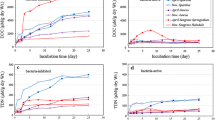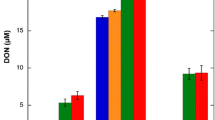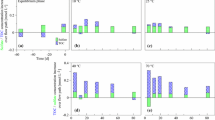Abstract
Purpose
Climate change and anthropogenic activities cause salinity fluctuations and frequent drought‒rewetting processes in lacustrine littoral zones. However, the joint effects of these processes on the quality and quantity of dissolved organic matter (DOM) in pore water and bacterial communities in sediments are not well understood. Therefore, an experiment was conducted to attempt to fill the above gaps.
Materials and methods
An experiment with three salinities (1200, 3600, and 6000 mg L−1) and the drought‒rewetting process was conducted. DOM characteristics were monitored by a UV–Vis spectrometer and a fluorescence spectrophotometer; bacterial communities were analyzed by 16S rRNA.
Results and discussion
Higher salinity (6000 mg L−1) and the drought‒rewetting process retained more humified, more aromatic, and less bioavailable DOM and maintained lower DOM concentrations in pore water. Before the drought-rewetting process, Hydrogenophilaceae, Oxalobacteraceae, and Flavobacteriaceae participated in DOM transformation, while Hydrogenophilaceae, Desulfobacteraceae, Anaerolineaceae, Planococcaceae, and Clostridiaceae were associated with DOM components after this process. The drought‒rewetting process, higher (6000 mg L−1) or lower (1200 mg L−1) salinity was not conducive to the stability of bacterial communities in sediments.
Conclusions
Salinity fluctuations and drought‒rewetting processes changed DOM characteristics in pore water and destabilized the bacterial communities. Therefore, it is necessary to take appropriate water recharge measures to avoid these processes.






Similar content being viewed by others

References
Agematu H, Suzuki K, Tsuya H (2011) Massilia sp. BS-1, a novel violacein-producing bacterium isolated from soil. Biosci Biotech Bioch 75:2008–2010. https://doi.org/10.1271/bbb.100729
Aguirre M, Abad D, Albaina A, Cralle L, Goni-Urriza MS, Estonba A, Zarraonaindia I (2017) Unraveling the environmental and anthropogenic drivers of bacterial community changes in the Estuary of Bilbao and its tributaries. PLoS One 12:e0178755. https://doi.org/10.1371/journal.pone.0178755
An Y, Gao Y, Zhang Y, Tong SZ, Liu XH (2019) Early establishment of Suaeda salsa population as affected by soil moisture and salinity: implications for pioneer species introduction in saline-sodic wetlands in Songnen Plain. China. Ecol Indicat 107:105654. https://doi.org/10.1016/j.ecolind.2019.105654
Bertness MD, Callaway R (1994) Positive interactions in communities. Trends Ecol Evolution 9:191–193. https://doi.org/10.1016/0169-5347(94)90088-4
Butturini A, Guarch A, Romaní AM, Freixa A, Amalfitano S, Fazi S, Ejarque E (2016) Hydrological conditions control in situ DOM retention and release along a Mediterranean river. Water Res 99:33–45. https://doi.org/10.1016/j.watres.2016.04.036
Chen J, Qian H (2017) Characterizing replenishment water, lake water and groundwater interactions by numerical modeling in arid region: a case study of Shahu Lake. Hydrol Sci J 62:104–113. https://doi.org/10.1080/02626667.2015.1133910
Cheng C, Wu J, You LD, Tang JK, Chai YD, Liu B, Khan MFS (2018) Novel insights into variation of dissolved organic matter during textile wastewater treatment by fluorescence excitation emission matrix. Chem Eng J 335:13–21. https://doi.org/10.1016/j.cej.2017.10.059
Coyte KZ, Schluter J, Foster KR (2015) The ecology of the microbiome: networks, competition, and stability. Science 350:663–666. https://doi.org/10.1126/science.aad2602
Douglas AR, Murgulet D, Abdulla HA (2021) Impacts of hydroclimatic variability on surface water and porewater dissolved organic matter in a semi-arid estuary. Mar Chem 235:104006. https://doi.org/10.1016/j.marchem.2021.104006
Fortunato CS, Crump BC (2015) Microbial gene abundance and expression patterns across a river to ocean salinity gradient. PLoS One 10:e0140578. https://doi.org/10.1371/journal.pone.0140578
Freixa A, Ejarque E, Crognale S, Amalfitano S, Fazi S, Butturini A, Romani AM (2016) Sediment microbial communities rely on different dissolved organic matter sources along a Mediterranean river continuum. Limnol Oceanogr 61(4):1389–1405. https://doi.org/10.1002/lno.10308
Gao JY, Feng WY, Yang F, Liu J, Fan WH, Wang Y, Zhang Q, Yang WH (2022) Effects of water quality and bacterial community composition on dissolved organic matter structure in Daihai Lake and the mechanisms. Environ Res 214:114109. https://doi.org/10.1016/j.envres.2022.114109
Gionchetta G, Oliva F, Menendez M, Laseras PL, Romani AM (2019) Key role of streambed moisture and flash storms for microbial resistance and resilience to long-term drought. Freshwater Biol 64(2):306–322. https://doi.org/10.1111/fwb.13218
Goldford JE, Lu N, Bajić D, Estrela S, Tikhonov M, Sanchez-Gorostiaga A, Segre D, Mehta P (2018) Sanchez A (2018) Emergent simplicity in microbial community assembly. Science 361:469–474. https://doi.org/10.1126/science.aat1168
He QL, Wang HY, Chen L, Gao SX, Zhang W, Song JY, Yu J (2020) Elevated salinity deteriorated enhanced biological phosphorus removal in an aerobic granular sludge sequencing batch reactor performing simultaneous nitrification, denitrification and phosphorus removal. J Hazard Mater 390:121782. https://doi.org/10.1016/j.jhazmat.2019.121782
Hernandez DJ, David AS, Menges ES, Searcy CA, Afkhami ME (2021) Environmental stress destabilizes microbial networks. ISME J 15:1722–1734. https://doi.org/10.1038/s41396-020-00882-x
Huang DQ, Fu JJ, Li ZY, Luan X, Huang Y, Fan NS, Jin RC (2022) Removal of extracellular deoxyribonucleic acid increases the permeability and mass transfer of anammox granular sludge with different sizes. Chemosphere 302:134898. https://doi.org/10.1016/j.chemosphere.2022.134898
Huang M, Zhou M, Li ZW, Ding X, Wen JJ, Jin CS, Wang L, Xiao LH, Chen J (2022) How do drying-wetting cycles influence availability of heavy metals in sediment? A perspective from DOM molecular composition. Water Res 220:118671. https://doi.org/10.1016/j.watres.2022.118671
Huguet A, Vacher L, Relexans S, Saubusse S, Parlanti E (2009) Properties of fluorescent dissolved organic matter in the Gironde Estuary. Org Geochem 40:706–719. https://doi.org/10.1016/j.orggeochem.2009.03.002
Jeppesen E, Kronvang B, Olesen JE, Audet J, Søndergaard M, Hoffmann CC, Andersen HE, Lauridsen TL, Liboriussen L, Larsen SE, Beklioğlu M, Meerhoff M, Özen A, Özkan K (2011) Climate change effects on nitrogen loading from cultivated catchments in Europe: implications for nitrogen retention, ecological state of lakes and adaptation. Hydrobiologia 663:1–21. https://doi.org/10.1007/s10750-010-0547-6
Ji MK, Kong WD, Yue LY, Wang JB, Deng Y, Zhu LP (2019) Salinity reduces bacterial diversity, but increases network complexity in Tibetan Plateau lakes. FEMS Microbiol Ecol 95:fiz190. https://doi.org/10.1093/femsec/fiz190
Keith DJ, Yoder JA, Freeman SA (2002) Spatial and temporal distribution of coloured dissolved organic matter (CDOM) in Narragansett Bay, Rhode Island: implications for phytoplankton in coastal waters. Estuar Coast Shelf S 55:705–717. https://doi.org/10.1006/ecss.2001.0922
Kim SI, Kim E, Aghasa A, Hwang S (2020) Shift in bacterial diversity in acidogenesis of gelatin and gluten seeded with various anaerobic digester inocula. Bioresour Technol 306:123158. https://doi.org/10.1016/j.biortech.2020.123158
Lau MP, Sander M, Gelbrecht J, Hupfer M (2015) Solid phases as important electron acceptors in freshwater organic sediments. Biogeochemistry 123:49–61. https://doi.org/10.1007/s10533-014-0052-5
Li YP, Wang SR, Zhang L, Zhao HC, Jiao LX, Zhao YL, He XS (2014) Composition and spectroscopic characteristics of dissolved organic matter extracted from the sediment of Erhai Lake in China. J Soils Sediments 14(9):1599–1611. https://doi.org/10.1007/s11368-014-0916-2
Li XZ, Guo L, Liu Y, Wang Y, She ZL, Gao MC, Zhao YG (2020) Effect of salinity and pH on dark fermentation with thermophilic bacteria pretreated swine wastewater. J Environ Manage 271:111023. https://doi.org/10.1016/j.jenvman.2020.111023
Liu Q, Tian YL, Liu Y, Yu M, Hou ZJ, He KJ, Xu H, Cui BS, Jiang Y (2021) Relationship between dissolved organic matter and phytoplankton community dynamics in a human-impacted subtropical river. J Clean Prod 289:125144. https://doi.org/10.1016/j.jclepro.2020.125144
Mao R, Li SY (2019) Temporal controls on dissolved organic carbon biodegradation in subtropical rivers: initial chemical composition versus stoichiometry. Sci Total Environ 651:3064–3069. https://doi.org/10.1016/j.scitotenv.2018.10.220
Murphy KR, Hambly A, Singh S, Henderson RK, Khan SJ (2011) Organic matter fluorescence in municipal water recycling schemes: toward a unified PARAFAC model. Environ Sci Technol 45:2909–2916. https://doi.org/10.1021/es103015e
Olshansky Y, Root RA, Chorover J (2018) Wet–dry cycles impact DOM retention in subsurface soils. Biogeosciences 15:821–832. https://doi.org/10.5194/bg-15-821-2018
Osterholz H, Kirchman DL, Niggemann J, Dittmar T (2018) Diversity of bacterial communities and dissolved organic matter in a temperate estuary. FEMS Microbiol Lett 94:fiy119. https://doi.org/10.1093/femsec/fiy119
Piccardi P, Vessman B, Mitri S (2019) Toxicity drives facilitation between 4 bacterial species. Proc Natl Acad Sci USA 116:15979–15984. https://doi.org/10.1073/pnas.1906172116
Poulin BA, Ryan JN, Aiken GR (2014) Effects of iron on optical properties of dissolved organic matter. Environ Sci Technol 48(17):10098–10106. https://doi.org/10.1021/es502670r
Pozzato L, Van Oevelen D, Moodley L, Soetaert K, Middelburg JJ (2013) Sink or link? The bacterial role in benthic carbon cycling in the Arabian Sea’s oxygen minimum zone. Biogeosciences 10:6879–6891. https://doi.org/10.5194/bgd-10-10399-2013
Qiao ZX, Hu SH, Wu YG, Sun R, Liu XY, Chan JW (2021) Changes in the fluorescence intensity, degradability, and aromaticity of organic carbon in ammonium and phenanthrene-polluted aquatic ecosystems. RSC Adv 11:1066. https://doi.org/10.1039/D0RA08655J
Ren Z, Qu XD, Zhang M, Yu Y, Peng WQ (2019) Distinct bacterial communities in wet and dry seasons during a seasonal water level fluctuation in the largest freshwater lake (Poyang Lake) in China. Front Microbiol 10:1167. https://doi.org/10.3389/fmicb.2019.01167
Santín C, Yamashita Y, Otero XL, Álvarez MÁ, Jaffé R (2009) Characterizing humic substances from estuarine soils and sediments by excitation-emission matrix spectroscopy and parallel factor analysis. Biogeochemistry 96:131–147. https://doi.org/10.1007/s10533-009-9349-1
Schiebel HN, Peri F, Chen RF (2019) Dissolved organic matter export from surface sediments of a New England salt marsh. Wetlands 40:1–13. https://doi.org/10.1007/s13157-019-01213-3
Singh S, Dash P, Silwal S, Feng G, Adeli A, Moorhead RJ (2017) Influence of land use and land cover on the spatial variability of dissolved organic matter in multiple aquatic environments. Environ Sci Pollut Res 24:14124–14141. https://doi.org/10.1007/s11356-017-8917-5
Strehse R, Bohne H, Amha Y, Leinweber P (2018) The influence of salt on dissolved organic matter from peat soils. Org Geochem 125:270–276. https://doi.org/10.1016/j.orggeochem.2018.10.001
Tian LF, Zhu X, Wang LM, Du P, Peng FQ, Pang QQ (2020) Long-term trends in water quality and influence of water recharge and climate on the water quality of brackish-water lakes: a case study of Shahu Lake. J Environ Manag 276:111290. https://doi.org/10.1016/j.jenvman.2020.111290
von Schiller D, Graeber D, Ribot M, Timoner X, Acuña V, Martí E, Sabater S, Tockner K (2015) Hydrological transitions drive dissolved organic matter quantity and composition in a temporary Mediterranean stream. Biogeochemistry 123:429–446. https://doi.org/10.1007/s10533-015-0077-4
Wang L, You LX, Zhang JM, Yang T, Zhang W, Zhang ZX, Liu PX, Wu S, Zhao F, Ma J (2018) Biodegradation of sulfadiazine in microbial fuel cells: reaction mechanism, biotoxicity removal and the correlation with reactor microbes. J Hazard Mater 360:402–411. https://doi.org/10.1016/j.jhazmat.2018.08.021
Wheeler KI, Levia DF, Hudson JE (2017) Tracking senescence-induced patterns in leaf litter leachate using parallel factor analysis (PARAFAC) modeling and self-organizing maps. J Geophys Res-Biogeo 122:2233–2250. https://doi.org/10.1002/2016JG003677
Wu JH, Xue CY, Tian R, Wang ST (2017) Lake water quality assessment: a case study of Shahu Lake in the semiarid loess area of northwest China. Environ Earth Sci 76:232. https://doi.org/10.1007/s12665-017-6516-x
Xu W, Gao A, He C, Shi Q, Hou Z, Zhao HZ (2020a) Using ESI FT-ICR MS to characterize dissolved organic matter in salt lakes with different salinity. Environ Sci Technol 54(20):12929–12937. https://doi.org/10.1021/acs.est.0c01681
Xu XC, Zhang R, Jiang HB, Yang FL (2020) Sulphur-based autotrophic denitrification of wastewater obtained following graphite production: long-term performance, microbial communities involved, and functional gene analysis. Bioresour Technol 306:123117. https://doi.org/10.1016/j.biortech.2020.123117
Yamashita Y, Tanoue E (2003) Chemical characterization of protein-like fluorophores in DOM in relation to aromatic amino acids. Mar Chem 82(3–4):255–271. https://doi.org/10.1016/S0304-4203(03)00073-2
Yan M, Korshin GV (2014) Comparative examination of effects of binding of different metals on chromophores of dissolved organic matter. Environ Sci Technol 48(6):3177–3185. https://doi.org/10.1021/es4045314
Yang LY, Kim D, Uzun H, Karanfil T, Hur J (2015) Assessing trihalomethanes (THMs) and N-nitrosodimethylamine (NDMA) formation potentials in drinking water treatment plants using fluorescence spectroscopy and parallel factor analysis. Chemosphere 121:84–91. https://doi.org/10.1016/j.chemosphere.2014.11.033
Ye TR, Zhao Z, Bai LL, Song N, Jiang HL (2020) Characteristics and bacterial community dynamics during extracellular polymeric substance (EPS) degradation of cyanobacterial blooms. Sci Total Environ 748:142309. https://doi.org/10.1016/j.scitotenv.2020.142309
Ye MY, Liang JL, Liao XJ, Li LL, Feng XD, Qian W, Zhou SY, Sun SY (2021) Bioleaching for detoxification of waste flotation tailings: relationship between EPS substances and bioleaching behavior. J Environ Manage 279:111795. https://doi.org/10.1016/j.jenvman.2020.111795
Zhang L, Xu KC, Peng YZ (2018) Composition characterization and transformation mechanism of refractory dissolved organic matter from an ANAMMOX reactor fed with mature landfill leachate. Bioresour Technol 250:413–421. https://doi.org/10.1016/j.biortech.2017.11.007
Zhou CX, Liu YD, Liu CX, Liu YY, Tfaily MM (2019) Compositional changes of dissolved organic carbon during its dynamic desorption from hyporheic zone sediments. Sci Total Environ 658:16–23. https://doi.org/10.1016/j.scitotenv.2018.12.189
Zhou M, Li ZW, Huang M, Ding X, Wen JJ, Wang L (2020) Impact of drying/wetting conditions on the binding characteristics of Cu(II) and Cd(II) with sediment dissolved organic matter. RSC Adv 10:34658. https://doi.org/10.1039/d0ra04839a
Zhu X, Wang ZB, Luo YD, Ma YS, Xu ZP, Wang LM, Peng FQ, Pang QQ, Li YP, He F, Xu B (2022) Overlying water fluoride concentrations influence dissolved organic matter composition and migration from pore water in sediment via bacterial mechanisms. Environ Sci Ecotech 10:100163. https://doi.org/10.1016/j.ese.2022.10016
Funding
This work was supported by the Innovative team project of Nanjing Institute of Environmental Sciences, MEE (GYZX200101), Open Fund of Guangdong Provincial Key Laboratory of Solid Wastes Pollution Control and Recycling (2020B121201003), Key R & D Program of Ningxia Hui Autonomous Region (2021BEG01002, 2019BFG02028), the National Natural Science Foundation of China (52270160), and Xinjiang Uygur Autonomous Region Science and Technology Program Plan (2022E02026).
Author information
Authors and Affiliations
Corresponding author
Ethics declarations
Competing interests
The authors declare no competing interests.
Additional information
Responsible editor: Shiming Ding
Publisher's Note
Springer Nature remains neutral with regard to jurisdictional claims in published maps and institutional affiliations.
Supplementary Information
Below is the link to the electronic supplementary material.
Rights and permissions
Springer Nature or its licensor (e.g. a society or other partner) holds exclusive rights to this article under a publishing agreement with the author(s) or other rightsholder(s); author self-archiving of the accepted manuscript version of this article is solely governed by the terms of such publishing agreement and applicable law.
About this article
Cite this article
Zhu, X., Xie, L., Ma, Y. et al. Effects of drought-rewetting processes and salinity variations on dissolved organic matter (DOM) transformation and bacterial communities in lacustrine sediments. J Soils Sediments 23, 4055–4068 (2023). https://doi.org/10.1007/s11368-023-03611-x
Received:
Accepted:
Published:
Issue Date:
DOI: https://doi.org/10.1007/s11368-023-03611-x



